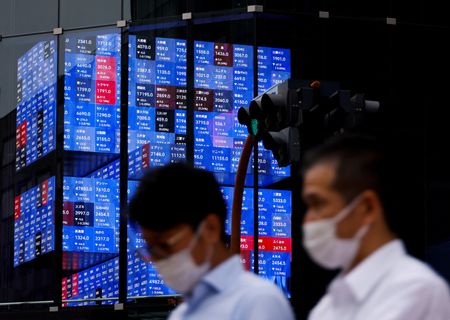
By Stella Qiu
SYDNEY (Reuters) – Asian shares were mixed and the dollar stood tall on Friday ahead of a key U.S. jobs report as investors braced for more aggressive rate hikes from the Federal Reserve, while commodities took an overnight dive amid new China lockdowns.
MSCI’s broadest index of Asia-Pacific shares outside Japan remained largely unchanged in early Asia trade, but was headed for its worst weekly performance in seven with a drop of 3%, as rising expectations of hawkish global rate hikes hit risky assets.
Japan’s Nikkei and Chinese bluechips were mostly unchanged, Hong Kong’s Hang Seng index eased 0.2% and South Korea gained 0.5%.
All eyes are now on U.S. August nonfarm payroll data due on Friday.
Analysts expect 285,000 jobs were added last month, while unemployment hovered at 3.5%. Investors may not like a strong number if it supports a continuation of aggressive rate hikes from the Fed, which could further boost the U.S. dollar and spur a sell-off in bonds.
Futures markets have priced in as much as a 75% chance the Fed will hike by 75 basis points at its September policy meeting, compared with a 69% probability a day earlier.
The dollar index, which measures the greenback against a basket of six major currencies, stood near its 20-year high at 109.55 on Friday. It eased slightly against the Japanese yen after notching a 24-year peak against the rate-sensitive currency in the previous session. The dollar was up 0.7% for the week.
“Markets broadly continue to absorb that central banks’ ‘whatever it takes’ to lower inflation message means much slower global economic growth,” said Tobin Gorey, agriculture strategy director at the Commonwealth Bank in a note. “And China’s weakening economy is an amplifying special factor in that scenario.”
On Thursday, the southwestern Chinese metropolis of Chengdu announced a lockdown of its 21.2 million residents, while the technology hub of Shenzhen also rolled out new social distancing rules as more Chinese cities tried to battle recurring COVID outbreaks.
Analysts at Nomura said what is becoming more concerning is that COVID hotspots in China are shifting away from remote regions and cities to provinces that matter much more to China’s national economy.
“We maintain the view that China will keep its zero-COVID policy until March 2023, when the (leadership) reshuffle is fully completed, but we now expect a slower pace of easing of the zero-COVID policy after March 2023,” Nomura said.
Oil prices tumbled 3% overnight before recovering some ground on Friday but were on track to post their worst weekly drop in four on fears COVID-19 curbs in China and weak global growth will hit demand.
Brent crude futures rose 1.3% to $93.56 a barrel on Friday while U.S. West Texas Intermediate (WTI) crude futures were up by a similar margin.
Overnight, the U.S. S&P 500 index climbed 0.3%, while the Nasdaq Composite finished down 0.3%.
In Europe, fears of a recession are on the rise, with a survey showing on Thursday that manufacturing activity across the euro zone declined again last month as consumers feeling the pinch from a deepening cost of living crisis cut spending.
Treasury yields eased slightly ahead of potentially strong payrolls data.
The yield on benchmark two-year notes hovered at 3.5117%, a touch lower than its 15-year high of 3.5510%, while the yield on 10-year bonds stood at 3.2609%, compared with its previous close of 3.2650%.
Gold was slightly higher. Spot gold was traded at $1697.59 per ounce. [GOL/]
(Reporting by Stella Qiu; Editing by Sam Holmes)

